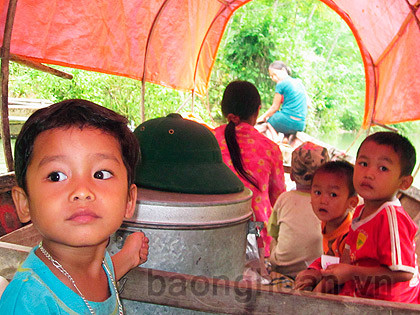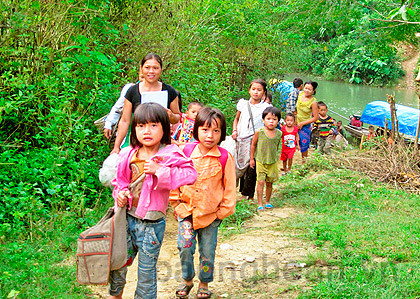Xop Chao - "3 no" version!
(Baonghean) - Previously, the lives of households in Xop Chao village (Luong Minh - Tuong Duong) were difficult due to the river. Now, after Ban Ve Hydropower Plant stored water, Xop Chao is like a lonely "oasis" in the middle of a large lake. Xop Chao is a village with 3 "no"s: no roads, no electricity grid and no phone signal.
To get to Xop Chao village, there is only one "way": by motorboat. At Thuong Luu wharf next to the hydroelectric dam, the boat owner patiently waited even though it was half a day late for the usual departure time. Our companions were 4 teachers in charge of Xop Chao class, including 1 kindergarten teacher and 3 primary school teachers.
It took us nearly an hour to reach Xop Chao village. The houses are hidden deep under the forest canopy as if they were playing hide-and-seek with strangers. The entrance to the village is "camouflaged" by vines and all kinds of rotten firewood and rubbish. Xop Chao used to belong to Kim Da commune (Tuong Duong). When this commune was dissolved, many villages moved to two resettlement communes in Thanh Son and Ngoc Lam (Thanh Chuong). Xop Chao and another village, Pung Co Moong, stayed in the old place, the flooded households only moved up the hill. Now Xop Chao village has 87 Khmu households with 462 people. The village is divided into 4 production teams scattered on the hills and because there are no roads, the only means of transportation for people to travel between residential areas is by boat. Therefore, children in the village are only 3 years old, and when they enter kindergarten, they have to get acquainted with boats and water wharves.
 |
| Styrofoam Porridge children go to class by boat. |
Xop Chao village has 40 primary school students and 21 preschool children, more than half of whom are in production teams such as Xop Chao, Xop Vi, Khe Pang, while the school is located in Pung Meo team. If the family does not have a boat, the students have to take a ferry service, with a round trip price of 10,000 VND. Thus, each month, students from poor families without a motorboat have to spend more than 200,000 VND on transportation. When the family runs out of money, parents have to abandon their fields and build rafts to take their children to school. Although it is very difficult, according to village chief Lo Van Hung, children here are very eager to learn from kindergarten. In the whole village, only a few children drop out of school due to especially difficult circumstances, very few primary school students drop out midway.
Early in the morning, Mr. Moong Van Thach from the Xop Chao production team (Xop Chao village) drove a boat carrying two children to school. While the father sat at the helm, the older child stood at the bow of the boat to remove all the rubbish and debris stuck to the boat, the younger child used a plastic ladle to scoop water that overflowed through the cracks into the boat's cabin. Mr. Thach happily said: "My two children are in first grade and fifth grade. Before, we didn't have a motorboat, so we had to paddle rafts to take them to school. After we bought this old boat, we can take them ourselves." According to Mr. Thach, his boat is now very old and dilapidated, but he doesn't have money to repair it, so he hasn't thought about buying life jackets or life buoys to ensure the safety of the children.
In the 2013-2014 school year, Mr. Bui Van Thang, a teacher at Luong Minh Primary School (Tuong Duong), returned to teach at Xop Chao. With over 20 years of teaching, and many times doing the duties of a teacher in a remote area, this was the first time Mr. Thang returned to a remote area like this. Also teaching at this remote area were 2 other teachers and 1 kindergarten teacher. Each primary school teacher in Luong Minh commune had the task of taking turns teaching at the Xop Chao remote area or Pung Co Moong village for 2 years.
Due to the inconvenient transportation, teachers often stay at school for months at a time. The amount of food they bring home each time is usually only enough for 1-2 weeks. Goods and staple foods are also sent by boat, which is often very late. After class, teachers divide the work: some go to the forest, some go to find vegetables, some carry nets and nets to the stream to catch fish. Fortunately, the Pung Meo stream is quite rich in fish, so there is not too much shortage of food.
As a particularly difficult village, all infrastructure is in the initial stages of construction. The school has been invested in by the state quite solidly, but the road to the village is only 500m from the river wharf to near the Xop Vi production team, but currently this road has been submerged under the lake. Village chief Lo Van Hung added: "This season can be called "happy" because boats can get close to the village. Every year, there are 3 or 4 months when the water recedes, usually from April to July, nearly ten kilometers from the village. At this time, the road to the village is muddy and waist-deep, so the village is almost isolated." Teacher Bui Van Thang, head of the Xop Chao block, continued: During the receding season, maintaining student numbers also becomes complicated. Because they cannot go to class, it is normal for students to stay home for a whole week.
 |
| Students of Xop Chao village go to school. |
During the 3 days without a boat to return, "stuck" in Xop Chao village, we experienced life without electricity, without phone signal, unable to contact friends. Because of this, this small "oasis" of Xop Chao seemed even more isolated from the outside world. Being quite talkative compared to the reserved Khmu community here, village chief Hung confided: Since moving to the high hills, the lives of the majority of Khmu people in Xop Chao village have become much more difficult than before. People's travel depends entirely on old, dilapidated motorboats, which pose many safety risks to people, especially during the rainy and stormy season. Because they cannot proactively choose their own means of transport, and because it is so far away, some people are afraid to go to the hospital when they are sick. Ms. Moong Thi Niem, a member of the Xop Chao production team, recently underwent treatment at the district general hospital. She said: At first, she only had a cough. Because the clinic was far away, she let it heal on its own. Unexpectedly, when the disease became serious, she had to stay in the hospital for nearly a month, spending nearly ten million dong.
Located in the middle of a lake, every time he wants to hold a meeting, village chief Hung must notify the production team leaders in writing three days in advance. After receiving the notice, in the evening, the team leaders will go to each alley with loudspeakers to inform the people. Then the people will row their rafts to the village chief's house to attend the meeting.
Saying goodbye to Xop Chao, we were always wondering. Like many other villages in the Ban Ve Hydroelectric Reservoir, the people of Xop Chao village had given up their land for national projects. Therefore, the villagers here are hoping to receive more attention from the authorities at all levels so that life will be less difficult, and the children will be more secure in their studies with the hope of escaping poverty tomorrow.
Article and photos: Huu Vi






